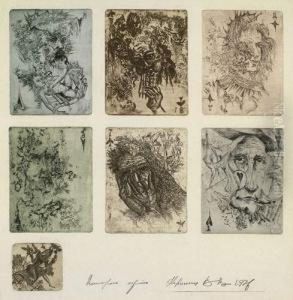Viacheslav Polonskii Paintings
Viacheslav Polonskii was a Russian poet and artist, whose life and career were dramatically cut short due to the turbulent events of the Russian Revolution and the Civil War. Born in 1896, Polonskii emerged from a generation that witnessed the radical transformation of Russian society, culture, and politics. His work, though not as widely recognized as that of his contemporaries, provides a poignant reflection of the era's tumultuous spirit, combining lyrical beauty with the acute sense of disintegration and despair characteristic of the period immediately preceding and following the October Revolution of 1917. Polonskii's artistic journey began in the vibrant cultural milieu of pre-revolutionary Russia, where he was influenced by the Symbolist movement, a major force in Russian literature and art at the turn of the 20th century. The Symbolists sought to reveal the hidden meanings behind the surface reality of the world, often delving into themes of love, death, and the mystical. Polonskii's work, characterized by its emotive intensity and symbolic richness, reflected these preoccupations, capturing the existential angst and the search for meaning that defined the era. Despite his early promise, Polonskii's career was tragically short-lived. He died in 1918, at the young age of 22, leaving behind a small but significant body of work that has since garnered appreciation for its historical and aesthetic qualities. The precise circumstances of his death remain a matter of speculation, but it is generally believed that he was a victim of the violent social upheaval that followed the Bolshevik seizure of power. In the years following his death, Polonskii's poetry and art have been revisited by scholars and enthusiasts of Russian culture, who have come to recognize his unique contribution to the artistic legacy of a pivotal moment in Russian history.
